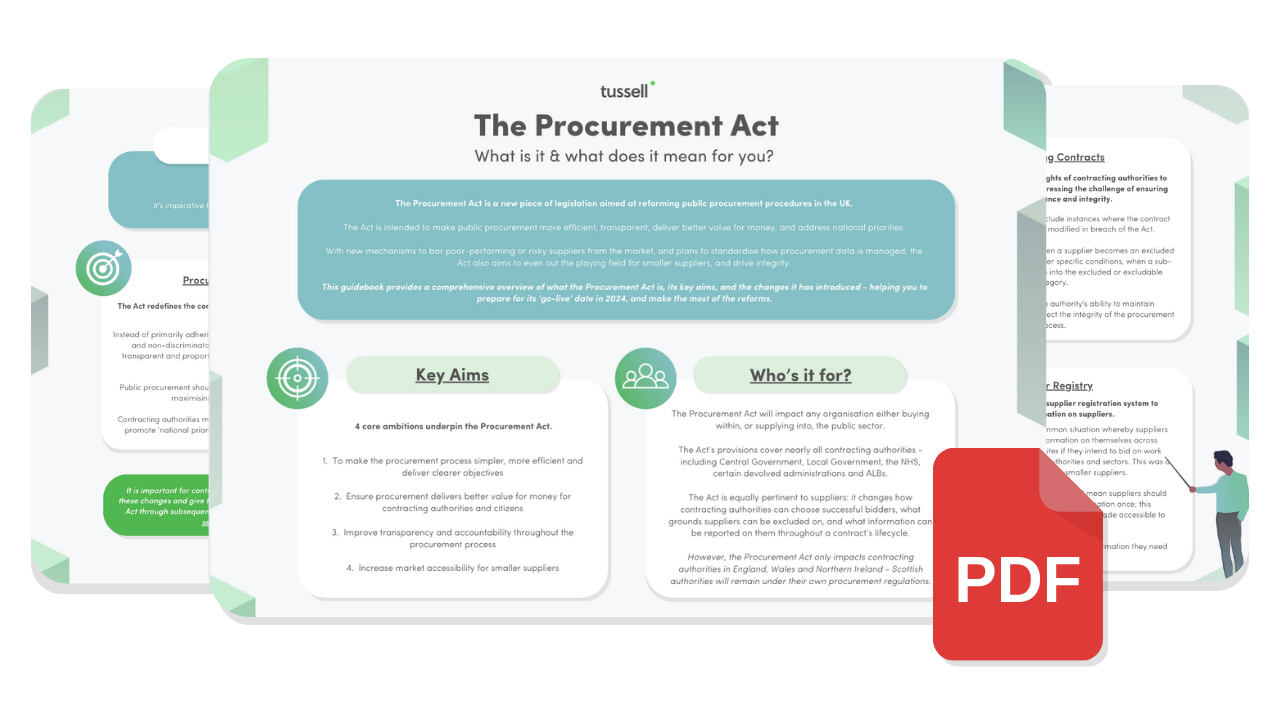On September 12th 2024, the Cabinet Office announced that the scheduled 'go-live' date for the 2023 Procurement Act was to be pushed back.
Instead of commencing on October 28th 2024, the Act will now come into effect on February 24th 2025 - a roughly 4 month delay.
In this quick blog, we explain why the Cabinet Office has delayed the Act, and what this means for suppliers and buyers.
Skip ahead to read about:
- Why is the Procurement Act being delayed?
- What could be in the updated National Procurement Policy Statement?
- What does the delay mean for buyers & suppliers?
***
This article is part of a series of articles on the 2023 Procurement Act.
Head to Tussell's Procurement Act Hub for all the information and resources you need to get Procurement Act ready.
📅 Why is the Procurement Act being delayed?
In a Written Parliamentary Statement submitted on Tuesday 12th September, the Parliamentary Secretary to the Cabinet Office, Georgia Gould MP, explained that the Act's go-live date needed to be pushed back to provide time for the government to update the National Procurement Policy Statement (NPPS).
The NPPS sets out the government's overarching priorities for public procurement, which contracting authorities must consider when awarding contracts.*
The production of the NPPS is mandated under Section 13 of the Procurement Act.
The current NPPS, written by the previous government, would have come into effect on October 28th 2024.
The new government, however, views that this NPPS "does not meet the challenge of applying the full potential of public procurement to deliver value for money, economic growth and social value."
By delaying the Act's go-live date, Gould explained, more time will be provided to create a "new National Procurement Policy Statement that clearly sets out this Government's priorities for public procurement in support of our missions."
The delay also means the go-live dates for the upgraded Find a Tender service, the Procurement Review Unit and the National Security Unit for Procurement will also be pushed back to February 2025.
* Note: consideration of the NPPS is not mandatory for all types of contracting authorities nor all procurements. For a full list of exemptions, refer to the Cabinet Office's NPPS documentation.
🔮 What could be in the updated National Procurement Policy Statement?
The NPPS is set to be updated to better reflect the new Labour goverment's priorities for public procurement.
What this will entail is yet to be seen, but we have some clues.
Here are a few of our predictions for which themes might receive greater emphasis in the new NPPS:
🌹 Promoting Labour's 'missions for government'
Gould's Written Statement explicitly says that the government wants public procurement to serve "the Government's missions".
This may be in reference to Labour's 5 'missions for government' announced in the run-up to the 2024 General Election. These include:
-
"Kickstart economic growth"
-
"Make Britain a clean energy superpower"
-
"Take back our streets"
-
"Break down barriers to opportunity"
-
"Build an NHS fit for the future"
The government, therefore, may look to rewrite the NPPS to directly or indirectly promote these 5 missions.
❌ Tackling contract fraud & promoting transparency
Labour has long been critical of, what they characterise to be, 'fraudulent' procurement at the heart of government.
Citing controversial contracts awarded during the COVID-19 pandemic, Labour's 2024 election manifesto pledged to shut down "the link between ministers and an inside track for public contracts".
Labour MPs have long been vocal on this issue. During a March 2024 House of Commons debate, then Shadow Minister in the Cabinet Office Dame Nia Griffith argued that the Procurement Act "will allow the same wasteful approach to emergency contracting rules that we saw during the pandemic".
In the spirit of more transparent procurement, Labour has separately committed to expanding the remit of the Freedom of Information Act. Labour aims for the Act "to apply to private companies that hold contracts to provide public services", so they must provide information relevant to the contracts they hold when requested.
Given all of this, it would make sense that the new NPPS explicitly references curtailing 'fraudulent' or 'wasteful' procurement, and emphasising transparency and openness throughout the procurement process.
Gould herself referred to "raising standards" as a key priority for the government in her Written Parliamentary Statement.
💷 Reining in on 'unnecessary' outsourcing
Labour has also been critical of how much the public sector outsources via procurement.
Labour's 'Plan to Make Work Pay' states their desire to "bring about the biggest wave of insourcing of public services in a generation".
The Plan states that before "any service is contracted out, public bodies must carry out a quick and proportionate public interest test, to understand whether that work could not be effectively done in-house".
One particular sector plays heavily into Labour's anti-outsourcing objectives: consultancy.
In July 2024, the new Labour Chancellor of the Exchequer, Rachel Reeves MP, announced that the government was committed to "reining in" spending with external consultants.
Indeed, Tussell's 2024 Management Consultancy Snapshot found that in FY23/24 alone, the UK public sector spend a near-record sum of £3.4 billion directly with management consultancy firms.
It would not be too surprising if the new NPPS asked contracting authorities to consider how they might develop products or solutions in-house before going to market.
🌱 Promoting social value and SMEs
Both Gould's Written Statement and Labour's election commitments strongly suggest that promoting social value and SME procurement will be a key priority in the new NPPS.
Labour's 2024 election manifesto explicitly pledged to reform procurement rules to give SMEs greater access to government contracts, and tackle late supply chain payments (which disproportionately affect small businesses)
Labour's 'Plan to Make Work Pay' has also pledged to create a new Social Value Council, which would be "tasked with reviewing how social value can be better strengthened and delivered in public contracts".
This document also makes reference to a new 'National Procurement Plan', which would mandate that social value be explicitly considered in public sector contract design.
Though not a huge departure to the previous government's objectives, it would make sense if the new NPPS put ever greater emphasis on contracting authorities' obligations to promote small businesses and social value via public procurement.
To learn more about how the Procurement Act is set to reform social value, click here to read our full explainer.
*
Based on Labour's past commitments, these themes - achieving Labour's missions for government, promoting fair procurement, reversing outsourcing, and championing SMEs & social value - may feature in the government's updated NPPS.
More broadly, the government's willingness to delay the Procurement Act's commencement to update the NPPS suggests the renewed importance they want to place on this policy.
🤔 What does the delay mean for buyers & suppliers?
4 more months now stand between us and the Procurement Act's implementation. What does this mean for the procurement community?
There are upsides - and downsides - to this delay.
On the one hand, the extra 4 months will be welcome news to many buyers and suppliers, who have now been afforded more time to prepare for the new regime.
The Cabinet Office's Deep Dive sessions are still scheduled to go ahead, and all government training and L&D material remains relevant.
Suppliers and buyers alike should utilise this added window to prepare your teams for the new regime.
On the other hand, the delay might throw a spanner in the works for buyers who were planning to commence procurement after October 28th using the new procurement legislation.
Contracting authorities will need to decide whether they want to delay these procurements until after February 24th, go to market pre-February but under the current regime's rules, or scrap them all altogether.
Similarly, frameworks that were designed to go-live after October 28th also hang in the balance. Suppliers should speak to framework's relevant contracting authority to understand next steps.
For a full Q&A on the delay, please refer to the Cabinet Office's guidance.
*
The Procurement Act's delayed commencement is a major bit of news.
We'll keep you posted on any further developments surrounding the Act - including a deep-dive analysis of the new NPPS once it's published.
Make sure you're subscribed to our biweekly newsletter to stay up-to-date.
We'll also continue to update the Tussell Procurement Act Hub with new explainers, guides and more in the run-up to the Act's February go-live date.
Access Tussell's Procurement Act Hub-1.png?width=442&height=324&name=Procurement%20Act%20Hub%20Graphics%20(1)-1.png)








.png?width=80&height=80&name=james%20v2%20(1).png)










